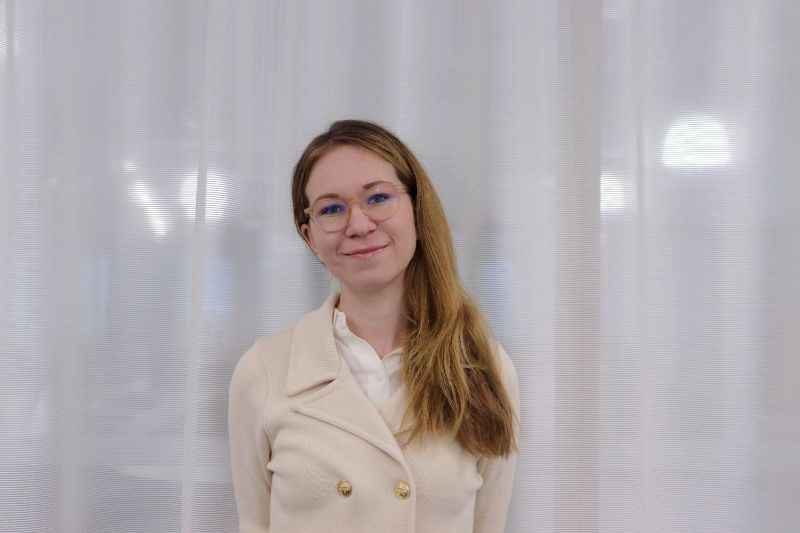District prosecutor
"As a prosecutor, it is my job to decide whether there is enough evidence of a crime to take legal action by prosecuting. I always make the decision based on the pre-trial investigation materials. The pre-trial investigation is done by the police, Customs or Border Guard. If there is enough evidence to prosecute, as a rule, the prosecutor has to pursue the case in district court proceedings."

- Marie Pihlström
- District Prosecutor at the National Prosecution Authority.
- Graduated Master of Laws from the University of Helsinki.
- 13 years of work experience in judicial service.
Briefly explain what you do for a living.
I have a public-service position as District Prosecutor for Financial Crimes. Half of the cases I process are financial crimes and half are occupational and environmental crimes and offences in office. As a prosecutor, it is my job to decide whether there is enough evidence of a crime to take legal action by prosecuting. I always make the decision based on the pre-trial investigation materials. The pre-trial investigation is done by the police, Customs or Border Guard. If there is enough evidence to prosecute, as a rule, the prosecutor has to pursue the case in district court proceedings.
The prosecutor will also participate in the pre-trial investigation of cases. In large and difficult cases and for certain categories of offences, the prosecutor acts as a consultant and provides legal guidance during the investigation stage. In addition, the prosecutor supervises the rights of the parties and sees to it that all the necessary information is available for the consideration of charges.
How have you ended up in the profession of your choice?
At the end of my studies, I did a one-month internship as a prosecutor. I started to be interested in the opportunity to make sure that things were done right and that the prosecutor acts objectively. The prosecutor’s task is to think about the common good, not the interests of an individual client. That makes the work feel meaningful.
Describe your typical working day or week.
A typical working week includes two days when we are in session, so in court, and three days when I am working on the consideration of charges and questions that determine whether I will write a non-prosecution decision or an application for a summons. The work also includes much more, such as regular meetings with pre-trial investigation authorities.
What kind of work environment or working hours do you have?
I do office work and represent people in court. There are pre-trial investigation authorities around the Helsinki Metropolitan Area, and meetings are held at police premises or over video connection, for example. I also work remotely.
A prosecutor does not have fixed working hours, so you have to schedule your work independently. In practice it’s mainly office hours, because certain tasks, such as participating in sessions, require attendance during office hours. Sometimes the workload requires working in the evenings and at weekends, and sometimes you can take time off, even in the middle of a working day.
What kind of competence or qualities are required in the profession?
A prosecutor’s most important skill is critical thinking. In this work, you have to be able to ask different questions and challenge yourself and the pre-trial investigation authorities to ensure that all perspectives are taken into account. Good motivation helps you improve at work, and over time you learn to perform better and work more efficiently.
What is the best thing about your profession?
This work allows you to promote fairness and the common good. It is also rewarding that you get to work with top-level professionals. I enjoy getting to cooperate with other professionals in the field, such as the tax authority, the Regional State Administrative Agencies acting as occupational safety and health authorities, and the ELY Centres who represent plaintiffs in environmental crimes.
What are the downsides of the profession or what seems challenging?
As a prosecutor, you have to tolerate disappointment and the fact that you can’t always influence everything, even if something feels contrary to your sense of justice. Maintaining the work role is not always easy, because even prosecutors are just people with human emotions and thoughts. You have to practise keeping a suitable distance to the work, and each prosecutor develops their own way of doing it.
What would you tell a person considering the profession of a prosecudor?
There are different ways to become a prosecutor, usually starting as an assistant prosecutor. You can become an assistant prosecutor through an internship, although I got here through a slightly different path. Working as a prosecutor, you have to dive deep into things, which requires curiosity. You also need courage to accept challenges and the ability to make decisions. You also have to develop constantly in this profession.
How do you see the future of your profession?
Society is changing constantly, technology is developing, and the ways how people interact are becoming more and more diverse. That also means that the ways of doing crime are changing, and prosecutors have to keep up.
The development of automation and artificial intelligence will impact the work in some way, but they cannot replace most of the work done by prosecutors because it takes consideration, looking at the big picture and using human intuition of what is just.
